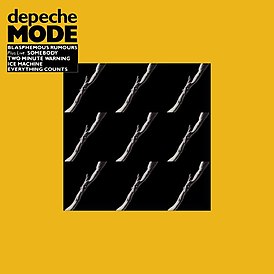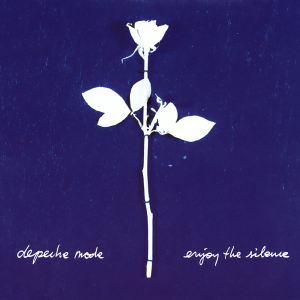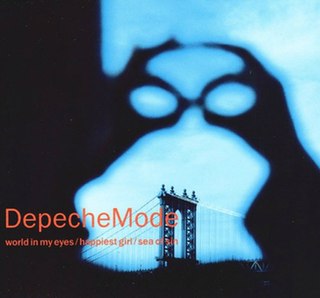
Depeche Mode are an English Pop / Rock band formed in Basildon in 1980. The group consists of a trio of Dave Gahan, Martin Gore and Andy Fletcher (keyboards).

Dave Gahan is an English singer-songwriter, best known as the lead singer of the electronic band Depeche Mode since their debut in 1980. Q magazine ranked Gahan No. 73 on its list of the "100 Greatest Singers" and No. 27 on its list of "The 100 Greatest Frontmen". Gahan is known for his "commanding presence on stage" and his "huge, deep baritone voice".

Vince Clarke is an English synth-pop musician and songwriter. Clarke has been the main composer and musician of the band Erasure since its inception in 1985, and was previously the main songwriter of several groups, including Depeche Mode, Yazoo, and the Assembly. In Erasure he is well known for his deadpan and low-key onstage demeanour, often remaining motionless over his keyboard, in sharp contrast to Andy Bell's animated and hyperactive frontman antics. Erasure have recorded over 200 songs and have sold over 28 million albums worldwide. Vince Clarke was inducted into the Rock and Roll Hall of Fame in 2020 as a member of Depeche Mode.

Violator is the seventh studio album by English electronic music band Depeche Mode. It was first released on 19 March 1990 through Mute Records internationally, and through Sire and Reprise Records in the United States.

Exciter is the tenth studio album by English electronic music band Depeche Mode. It was first released on 14 May 2001 in the United Kingdom by Mute Records and a day later in the United States by Reprise Records. The album was produced by Mark Bell, and was supported by the Exciter Tour, one of the band's most successful tours.

People Are People is a Depeche Mode compilation album released in North America by Sire Records on 2 July 1984. Sire sensed it needed a new approach in its release policy since the band's 1983 effort Construction Time Again had failed to chart in the US.

Alan Charles Wilder is an English musician, composer, arranger, record producer, and a former member of the electronic band Depeche Mode from 1982 to 1995. Since his departure from the band, the musical project called Recoil became his primary musical enterprise, which initially started as a side project to Depeche Mode in 1986. Wilder has also provided production and remixing services to the bands Nitzer Ebb and Curve. Alan Wilder was inducted into the Rock and Roll Hall of Fame in 2020 as a member of Depeche Mode. He is a classically trained musician.

"Just Can't Get Enough" is a song by the English electronic music band Depeche Mode. It was their third single, released in September 1981, a month before the release of their debut album, Speak and Spell. It was recorded during the summer of that year at Blackwing Studios, and was the band's first single to be released in the United States, on 18 February 1982. A riff-driven synthpop song, "Just Can't Get Enough" was the final single to be written by founding member Vince Clarke, who left the band in November 1981.
Recoil is a musical project created by English musician and former Depeche Mode member Alan Wilder. Essentially a solo venture, Recoil began whilst Wilder was still in Depeche Mode as an outlet for his experimental, less pop-oriented compositions. Once he announced his departure from the group in 1995, Recoil became Wilder's primary musical enterprise.

"Blasphemous Rumours"/"Somebody" is Depeche Mode's twelfth UK single and first double A-side single, released on 29 October 1984.

"Personal Jesus" is a song by English Pop / Rock band Depeche Mode. It was released as the lead single from their seventh studio album, Violator (1990) in 1989. It reached No. 13 on the UK Singles Chart and No. 28 on the Billboard Hot 100. The single was their first to make the US Top 40 since 1984's "People Are People", and was their first gold-certified single in the US. In Germany, "Personal Jesus" is one of the band's longest-charting songs, staying on the singles chart for 23 weeks.

"Enjoy the Silence" is a song by English electronic music band Depeche Mode. Recorded in 1989, it was released as the second single from their seventh studio album, Violator (1990), on 5 February 1990. The single is Gold certificated in the US and Germany. The song won Best British Single at the 1991 Brit Awards. "Enjoy the Silence" was re-released as a single in 2004 for the Depeche Mode remix project Remixes 81–04, and was titled "Enjoy the Silence (Reinterpreted)" or, more simply, "Enjoy the Silence 04".

"World in My Eyes" is a song by English electronic music band Depeche Mode. It was released on 2 September 1990 as the fourth and final single from their seventh studio album, Violator (1990). It peaked at number two in Denmark and Spain, number 17 on the UK Singles Chart, and number 52 on the US Billboard Hot 100.

"I Feel You" is a song by Depeche Mode, released on 15 February 1993 as their 27th UK single and the first single from the album Songs of Faith and Devotion. The song peaked at number eight on the UK Singles Chart and also made number one and number three on the US Modern Rock Tracks and Hot Dance Club Play charts, respectively. It was one of the band's highest-charting singles worldwide.

"Only When I Lose Myself" is a song by English electronic music band Depeche Mode. It was made exclusively for their 1998 compilation The Singles 86>98 and released as a single on 7 September 1998. It is the first non-album studio single since "It's Called a Heart" in 1985, and is also one of the rare singles to have two limited editions.

The discography of English electronic music group Depeche Mode consists of 14 studio albums, six live albums, ten compilation albums, 15 box sets, 13 video albums, 55 singles, and 70 music videos. The band's music has been released on several labels, including Some Bizzare, Mute Records, Sire Records, Reprise Records, and Columbia Records. Formed in Basildon, Essex, England in 1980, the group's original line-up was Dave Gahan, Martin Gore, Andy Fletcher and Vince Clarke. Vince Clarke left the band after the release of their 1981 debut album Speak & Spell and was replaced by Alan Wilder, who was a band member from 1982 to 1995. Following Wilder's departure, Gahan, Gore, and Fletcher continued as a trio.

The Best of Depeche Mode Volume 1 is a greatest hits album by English electronic music band Depeche Mode. It was released on 8 November 2006 by Mute Records. The album consists of select Depeche Mode singles from their then-25-year career, as well as the previously unreleased track "Martyr"—recorded during the Playing the Angel sessions—which was released as a single in late October 2006.

Marsheaux is a Greek synthpop duo formed in Athens in 2003. The group is composed of vocalists, songwriters and keyboardists Marianthi Melitsi and Sophie Sarigiannidou. The name Marsheaux is derived from the first syllable of each band member's name. Both members sing almost exclusively in English. Andy McCluskey of OMD said about this band: "I do have a soft spot for Marsheaux I have to say. They have a certain sort of wispy, melancholic charm".

Soulsavers is an English-American production and remix team composed of Rich Machin and Ian Glover. The Soulsavers' downtempo electronica sound incorporates influences of rock, gospel, soul, and country. To date, the duo has released six albums: Tough Guys Don't Dance in 2003, It's Not How Far You Fall, It's the Way You Land in 2007, Broken in 2009, The Light the Dead See in 2012 and Angels & Ghosts in 2015. Their last studio album, Kubrick, was released in 2015.

Sounds of the Universe is the twelfth studio album by English electronic music band Depeche Mode. It was released on 17 April 2009 by Mute Records. The album was supported by the 2009–2010 concert tour Tour of the Universe. Three singles were released from the album: "Wrong", "Peace", and a double A-side of "Fragile Tension" and "Hole to Feed". "Perfect" was also released in the United States as a promotional single.



















